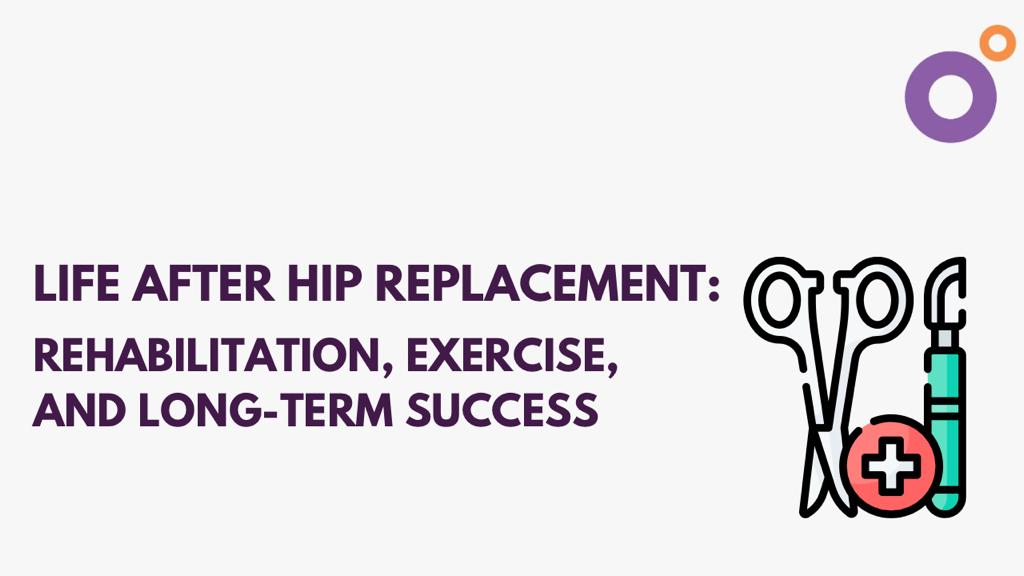
Life After Hip Replacement: Rehabilitation, Exercise, and Long-Term Success
Medically reviewed by

Dr. Akhil Bansal
MBBS, MS - Orthopedics
If you are someone who has recently gone under a hip replacement surgery, then you are at the right place. Undergoing hip replacement surgery is a very crucial step towards improving mobility, reducing pain, and regaining an active lifestyle. However, after the surgery, the healing journey doesn’t come to an end itself. To stay active and enjoy long-term success and to reap the maximum benefits of hip replacement, few things are very important like postoperative rehabilitation, regular exercise, and adopting a healthy lifestyle. In this article, we will talk about the key aspects of life after hip replacement, including rehabilitation strategies, exercise guidelines, and tips to enjoy the long-term success. By actively participating in the following given points, individuals can enjoy a healthy and active life post-surgery.
Postoperative Rehabilitation:
a. Physical Therapy:
The process of rehabilitation is incomplete without physical therapy. A well-qualified physical therapist will guide you through precise exercises and movements to increase hip joint strength, flexibility, and mobility.b. Gait Training:
It is very important to learn the proper technique for walking and using assistive devices. Also, it is important for restoring a natural gait pattern and preventing falls.c. Pain Management:
Managing post-surgery pain through prescribed medications, ice or heat therapy, and various relaxation techniques is crucial for maintaining comfort, and ease during rehabilitation.d. Gradual Progression:
To avoid certain problems and overexertion, rehabilitation should be approached gradually, increasing the intensity and duration of exercises as prescribed by your healthcare team.Exercise Guidelines:
a. Low-Impact Activities:
Low-impact exercises, such as stationary cycling, and elliptical training, can help the heart and joints without putting too much pressure on the hip and also provide cardiovascular benefits.b. Strengthening Exercises:
Include hip targeting exercises such as leg raises, hip abductions, and bridging exercises, to strengthen the surrounding muscles and to bring stability.c. Flexibility and Range of Motion:
Indulge in gentle stretching exercises that helps in being more flexible and maintain a healthy range of motion in the hip joint.d. Avoid High-Impact and Strenuous Activities:
Extreme activities like running, jumping, or sudden impact should generally be avoided to prevent excessive stress on the hip joint.Lifestyle Considerations:
a. Weight Management:
One of the most important thing is to maintain a healthy weight in order to reduce stress on the hip joint. Following a balanced diet and performing regular physical activity can help in weight management.b. Joint Protection:
Be careful of movements that puts excessive strain on the hip, such as heavy lifting or repetitive high-impact activities, it can create a huge problem. Try to utilize proper body mechanics and assistive devices, if needed.c. Regular Check-ups:
Attend your orthopedic surgeon regular appointments to keep a check on the progress of your hip replacement, identify any potential issues, and voice any concerns.Long-Term Success:
a. Listen to Your Body:
Keep a check on any new or persistent pain or discomfort in the hip joint. If you experience unusual symptoms, consult with your healthcare provider immediately.b. Maintain an Active Lifestyle:
Maintaining an active lifestyle by regular physical activity and exercise are crucial for maintaining joint health, as well as overall health and preserving the benefits of hip replacement.c. Adapt to Age-Related Changes:
As you age, it's crucial to modify your exercise routine and lifestyle practices to account for any changes in mobility or physical capabilities.d. Mindful Participation in Activities:
Try to indulge in activities that best suits your abilities and interests while being extremely cautious of potential risks or excessive strain on the hip joint.To conclude, life post hip replacement surgery offers the opportunity for renewed mobility and an active, healthy lifestyle. By giving utmost importance to postoperative rehabilitation, following exercise guidelines, and making corrective lifestyle choices, individuals can achieve long-term success and maintain the benefits of their hip replacement. Always keep in touch with your healthcare team for personalized advice, and embrace the possibilities of a fulfilling life after hip replacement.